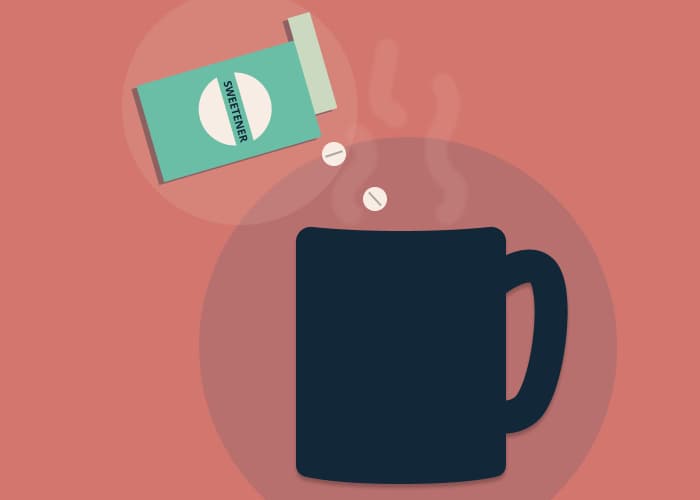What are sugar substitutes?
Sugar substitutes are either chemically derived or plant-based substances used to sweeten and enhance the flavour of the foods we eat. They are also termed artificial sweeteners, non-caloric or zero-calorie sweeteners. These sweeteners can be used in place of sugar in daily food preparations or processed foods like syrups, sauces, jams, jellies, beverages.
Most of the sugar substitutes are a lot sweeter than the table sugar that we use. We require them in small amounts to achieve the same level of sweetness as that of table sugar. Some of them are zero-calorie, while some are low in calories.
Are sugar substitutes beneficial?
As sugar substitutes are not sugar, they do not cause any health effects that sugar usually causes. That means no tooth decay, no spike in blood sugar levels, no increase in signs of ageing. Thus, it is beneficial for people trying to manage weight and diabetes. It is also helpful for those who are trying to control their caloric intake.
How do we identify if a product has a sugar substitute?
99% of the time, it is mentioned on the food label. Foods labelled as light, sugar-free, no-calorie, or low calorie most likely contain sugar substitutes.

What are the common sugar substitutes?
There are different artificial sweeteners available in the market that are synthetically prepared. They are considered safe to use and are easily available in the market without the requirement of any certification from the US FDA. These include:
1. Acesulfame: A zero-calorie sugar substitute, it is almost 200 times sweeter than table sugar. It is often also written as Ace-K. It is usually used in a combination with other sweeteners. Most commonly, it is found in candies, soft drinks, and frozen desserts. It is also used to replace sugar in coffees, milkshakes and other beverages. Upon heating, it does not lose its taste. It is also used in some dental products like mouthwash and toothpaste.
2. Aspartame: It is a combination of 2 different amino acids - aspartic acid and phenylalanine. It is almost 200 times sweeter than sugar. Most common food items that use aspartame include soft drinks, cake mixes, puddings, flavoured yoghurts, and frozen desserts. In cafes and restaurants, it is commonly given as a substitute for table sugar. Even certain medications, such as contain aspartame.
However, remember that aspartame turns slightly bitter when heated. So, add them to your foods after the cooking process is finished. Also, people with the condition phenylketonuria cannot metabolise phenylalanine properly and should avoid aspartame.
3. Sucralose: It is a zero-calorie sugar substitute that is 500-600 times sweeter than table sugar. It is used in juices, syrups, candies, canned fruits, and medicines. It is also suited for baking.
4. Saccharin: Saccharin is a low-calorie sugar substitute and anywhere between 200-700 times sweeter than table sugar. It is also found in canned foods like pineapples, cherries, and certain medicines. A drawback of saccharin is that it leaves an aftertaste in the mouth.
There are also some other sugar substitutes available in the market.
Stevia: Stevia is a plant-based zero-calorie natural sweetener. It is made from the extract of the stevia leaves called steviol glycoside. It is 300-400 times sweeter than sugar. It is found in desserts, chewing gum, candies and can also be used for baking and similar processes that require heating. However, remember that it also has a slightly bitter aftertaste.
Sugar alcohols: Although named alcohol, they are not that. A drawback of saccharin is that it leaves an aftertaste in the mouth. Sugar alcohols are also known as polyols. They naturally occur in some fruits and can even be produced synthetically. Erythritol, maltitol, mannitol, xylitol or sorbitol are the different sugar alcohols.
Sugar alcohols are not as sweet as other sugar substitutes. They are only 30-75% sweeter than table sugar or may even be of the same sweetness. These are also not zero-calorie sugar substitutes. They provide 0-2.5 calories per gm. Sugar alcohols are categorised as safe to be used in food and drinks and are commonly used in chewing gums, toothpaste, mouthwash.
What are the harmful effects of sugar substitutes on our bodies?
Although considered safe to use, still there are some risks involved with using them too.
Effects on appetite
Since sugar substitutes do not affect the insulin level, many people claim an increase in their appetite. They tend to eat more than they need. They do not feel satisfied after eating the food. It makes your brain feel that you’re still hungry, and you end up eating more that way.
Effects on weight
As sugar substitutes affect your appetite, it eventually affects your weight too. To feel satiated, you eat more, and in the process, gain weight unnecessarily.
Effects on the gut microbiome
Artificial sweeteners can negatively impact your gut microbiome, which is responsible for controlling digestion and benefiting your immune system and many other aspects of health. They can worsen insulin resistance and lead to a negative shift in your gut bacteria that promotes blood sugar dysregulation.
Cardiometabolic risk
Regular consumption of artificial sweeteners is also associated with adverse longtime cardiometabolic effects such as high blood pressure, high blood sugar, excess belly fat, and abnormal cholesterol levels. These conditions increase your risk of chronic illnesses such as stroke, heart disease, and type 2 diabetes.
Effects on cardiometabolic effects
Some studies have found that long term consumption of artificial sweeteners can cause unpleasant conditions like fatigue, headache, depression, anxiety.
So, should you avoid sugar substitutes?
It depends on your goal and motive behind using artificial sweeteners. But if you can, you should avoid it. In case you choose to consume them, make sure it is in moderation.
What are some natural and safer substitutes for table sugar?
Instead of table sugar and artificial sweeteners, you can use many other natural forms of sugar. Some of them also provide other vitamins and minerals that sugar or artificial sweeteners do not have. However, even these should be used in moderation.
- Stevia
- Monk fruit extract
- Coconut sugar
- Jaggery
- Honey
- Natural fruits
Conclusion
There are no benefits of sugar substitutes apart from the fact that they are zero calories and do not cause tooth decay. Even if they are considered safe to use and you choose to have them, it is always better to consume them in moderation. To conclude, natural forms of sugars are always better when compared to processed sugars. Talk to your doctor before switching to artificial sweeteners and learn more about the same!
Disclaimer: This information is educational and should not be construed as medical advice. Please consult your doctor before making any dietary changes or adding supplements.
Proactive For Her is a digital clinic for women, offering accessible, personalised, and confidential healthcare solutions. We offer out-patient care, diagnostic services and programs for various health concerns of Indian women, across their lifetime - from puberty to pregnancy to menopause.

